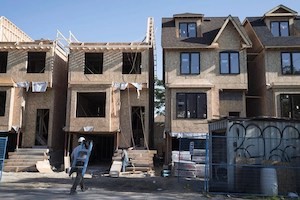RESCON pre-budget submission calls for supports to ease housing crisis and employ more foreign-trained construction workers
The Residential Construction Council of Ontario (RESCON) is calling on the provincial government to provide nearly $2 million in funding to support an initiative that it says will help ease Ontario’s housing crisis.
 In its pre-budget submission to Finance Minister Peter Bethlenfalvy, RESCON has called on the province to support the One Ontario initiative, which aims to establish data exchange standards for a province-wide, digital e-permitting system for residential construction. The initiative, which was launched by AECO Innovation Lab, is supported by RESCON and other industry stakeholders.
In its pre-budget submission to Finance Minister Peter Bethlenfalvy, RESCON has called on the province to support the One Ontario initiative, which aims to establish data exchange standards for a province-wide, digital e-permitting system for residential construction. The initiative, which was launched by AECO Innovation Lab, is supported by RESCON and other industry stakeholders.
RESCON president Richard Lyall is a member of AECO’s board of advisors.
Specifically, RESCON wants the province to provide $1.975 million in funding for One Ontario. Its submission to the finance minister notes that Canada ranked 64th out of 190 countries when it comes to construction permitting and 34th out of 35 OECD countries in the length of time it takes to get a project approved.
“We must find ways to speed-up the construction of new housing as immigration is rising and demand is only going to increase,” says Lyall. “We need to accelerate the development review process so builders can get shovels in the ground quicker. We’re in a housing crisis and the One Ontario initiative sets the stage for a speedier, more efficient approvals process.”
On the skilled trades front, RESCON wants the Ministry of Labour, Training and Skills Development to expand the list of professions allowed under the Ontario Immigrant Nominee Program to allow more foreign-trained construction workers to work in the voluntary trades, eliminate repetitive paperwork and make the hiring process more streamlined for employers.
RESCON also wants government to create an Apprenticeship Training Recognition program which will encourage and promote a culture of training and offer financial support to young people seeking to pursue a career in a non-apprenticeable skilled trade, and invest $2 million to purchase and install tower cranes for an apprentice program at Durham College.
“Nearly one quarter of the construction workforce in the Greater Toronto Area is expected to retire by 2030, so we must lay the groundwork to get more international workers and youth into the industry,” says Lyall. “Skilled labour is critical to the homebuilding industry. We must recruit and train new workers.”
Finally, RESCON says it is concerned that the process of harmonizing construction requirements across Canada is being undermined by municipal jurisdictions that have implemented their own technical requirements. The organization says is commendable that municipal governments have shown leadership in the fight against climate change by implementing municipal green standards, but acting independently and hastily ahead of higher-tier governments can carry unintended consequences.
It goes on to say that many municipal green standards have proven futile in lowering greenhouse gas emissions and improving energy efficiency.
RESCON supports the provincial and national building code development process over municipal programs, as the built-in checks and balances vet code change proposals properly and institute accountability to the process before any changes can be made.








